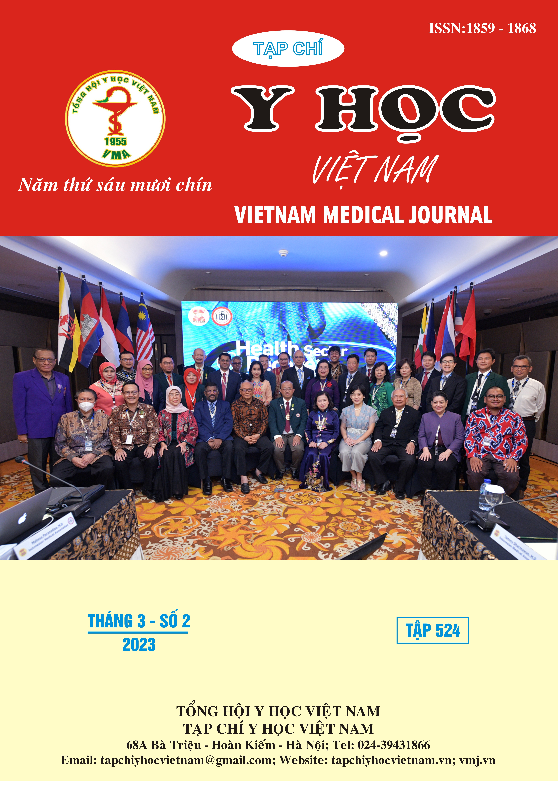SLEEP QUALITY AND RELATED FACTORS AMONG STUDENTS OF PREVENTIVE MEDICINE PHYSICIAN AT UNIVERSITY OF MEDICINE AND PHARMACY AT HO CHI MINH CITY IN THE CONTEXT OF THE COVID-19 PANDEMIC IN 2022
Main Article Content
Abstract
Objective: Determine the overall prevalence of poor sleep quality and its related factors among students of preventive medicine physician at University of Medicine and Pharmacy at Ho Chi Minh City (UMP HCMC) in 2022. Subjects and Methods: A cross-sectional study was conducted in which 570 students of preventive medicine physician at UMP HCMC participated. The Pittsburgh sleep quality index scale (PSQI) was used to measure sleep quality of students. Results: The prevalence of poor sleep quality among students was 44%. Research results show that the propotion of poor sleep quality of fourth-year students was lower than the proportion of sixth-year students; the proportion of poor sleep quality of students who got good scores was lower than the proportion of students who got average and poor scores; the proportion of poor sleep quality of students who used to be or currently infected with Covid-19 was lower than the proportion of students who not infected with Covid-19; the proportion of poor sleep quality of students who got poor social interaction was higher than the proportion of students who were good at social interaction; the proportion of poor sleep quality of students who had trouble sleeping due to noise was higher than the proportion of students who didn’t have trouble sleeping due to noise. Conclusion: The prevalence of poor sleep quality among students of preventive medicine physician at UMP HCMC is pretty high. The academic year, classification of students based on their academic scores, Coronavirus symptoms, social interaction and the noise in bedroom at bedtime are factors related to sleep quality of student.
Article Details
Keywords
sleep quality, students of preventive medicine physician, PSQI
References
2. A. I. Almojali, S. A. Almalki, A. S. Alothman, E. M. Masuadi, M. K. Alaqeel. The prevalence and association of stress with sleep quality among medical students. J Epidemiol Glob Health, 7 (3), 169-174, 2017.
3. B. Krishnan, R. K. Sanjeev, R. G. Latti. Quality of Sleep Among Bedtime Smartphone Users. Int J Prev Med, 11, pp.114, 2020.
4. C. K. Kaparounaki, M. E. Patsali, D. V. Mousa, E. V. K. Papadopoulou, K. K. K. Papadopoulou, K. N. Fountoulakis. University students' mental health amidst the COVID-19 quarantine in Greece. Psychiatry Res, 290, 2020.
5. H. Berhanu, A. Mossie, S. Tadesse, D. Geleta. Prevalence and Associated Factors of Sleep Quality among Adults in Jimma Town, Southwest Ethiopia: A Community-Based Cross-Sectional Study. Sleep Disorders, 10, 2018.
6. National Health Service. Why lack of sleep is bad for your health. https://www.nhs.uk/live-well/sleep-and-tiredness/why-lack-of-sleep-is-bad-for-your-health/, Accessed on 01/09/2021.
7. N. Cellini, F. Conte, O. De Rosa, F. Giganti, S. Malloggi, M. Reyt. Changes in sleep timing and subjective sleep quality during the COVID-19 lockdown in Italy and Belgium: age, gender and working status as modulating factors. Sleep Med, 77, 112-119, 2021.
8. Q. Huang, Y. Li, S. Huang, J. Qi, T. Shao, X. Chen. Smartphone Use and Sleep Quality in Chinese College Students: A Preliminary Study. Front Psychiatry, 11, 352, 2020.
9. Q. Meng, J. Zhang, J. Kang, Y. Wu. Effects of sound environment on the sleep of college students in China. Sci Total Environ, 705, 2020.
10. R. K. Mwape, D. Mulenga. Consumption of Energy Drinks and Their Effects on Sleep Quality among Students at the Copperbelt University School of Medicine in Zambia. Sleep Disord, 2019.


